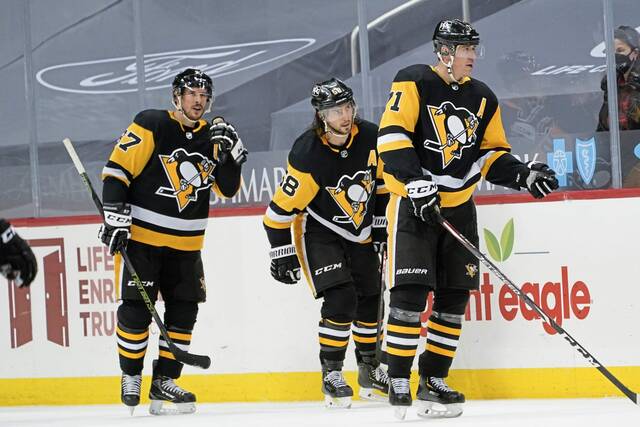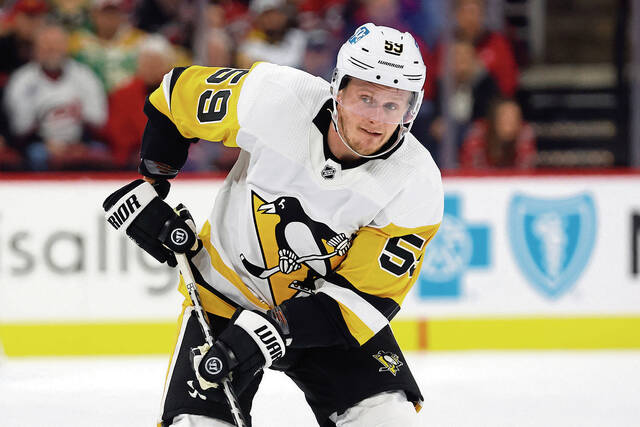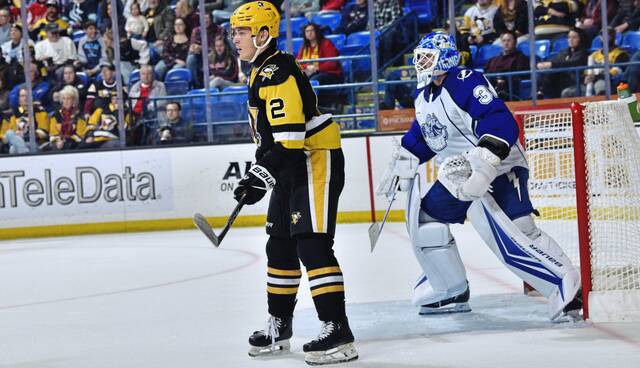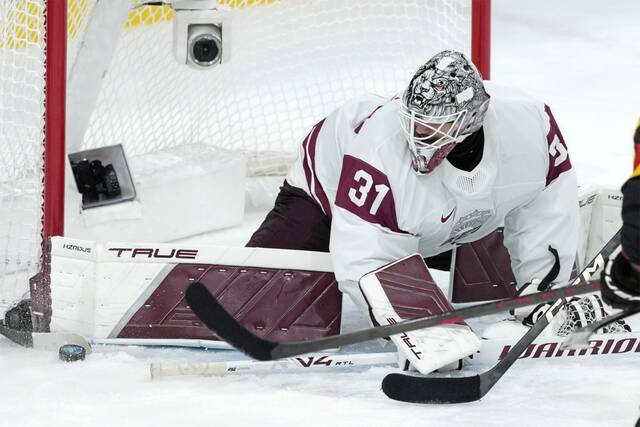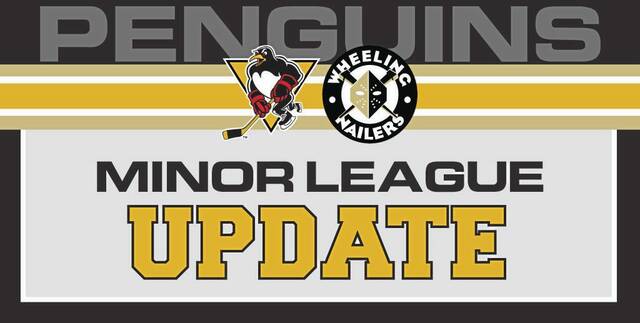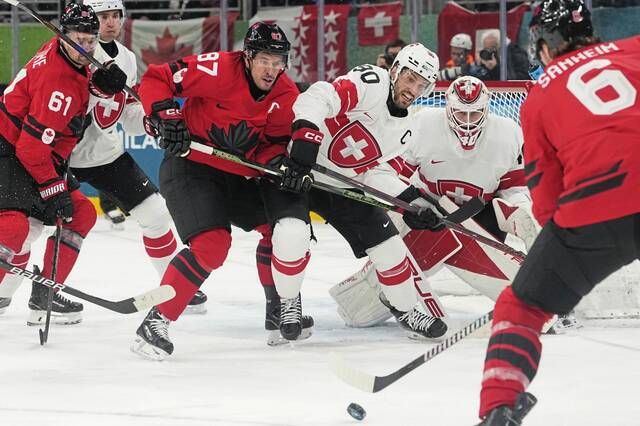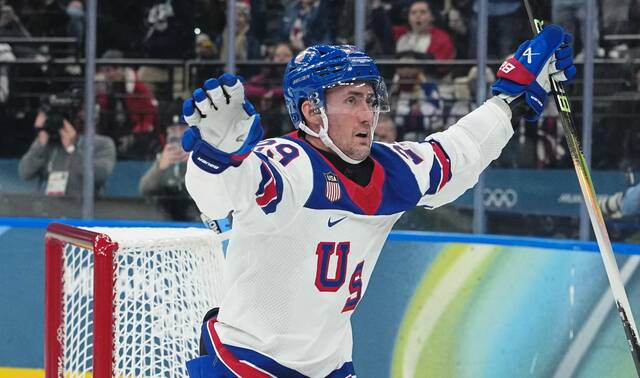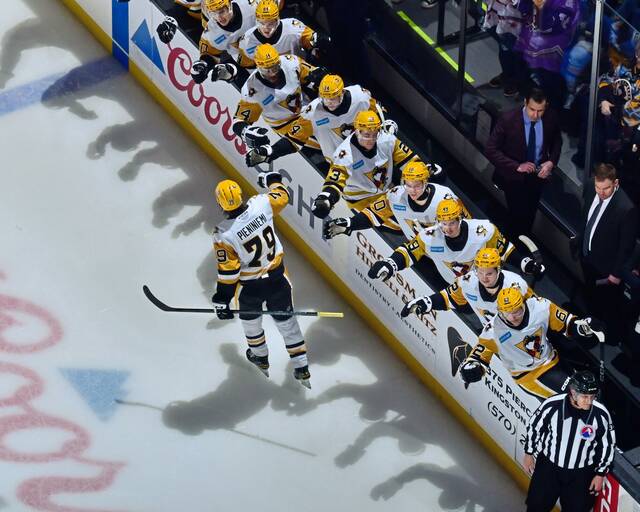Kyle Dubas can finally sleep.
At least a little bit more soundly.
For the better part of the summer, the Pittsburgh Penguins’ president of hockey operations has been quietly but voraciously pursuing Erik Karlsson, the dynamic whirlwind of an offensive defenseman who can tilt the ice anytime he puts a skate on a rink.
Dating to the days after the NHL Draft in June, Dubas has regularly been in contact with San Jose Sharks general manager Mike Grier exchanging offers and trying to figure out how to orchestrate a complicated transaction that would result in Karlsson donning a Penguins jersey.
All of those ruminations came to a conclusion Sunday when the Penguins and Sharks (with an assist from the Montreal Canadiens) made one of the largest trades in NHL history as Karlsson became a member of the Penguins.
And with that came some measure of rest for Dubas late in the offseason.
“When it’s a good player that you really want, I think that’s why you spent a lot of your nights staring up at the ceiling rather than sleeping, (thinking) of different ways you can make it happen, know the market, which other teams are going to jump in, who can beat you to it, how they can beat you to it, how can you out-do them,” Dubas said during a new conference Monday at the team’s facility in Cranberry.
“I would say we pushed hardest in the last week to try and make it all work and happen.”
A lot had to happen for the exchange to take place.
Most notably, plenty of salaries and contracts had to be moved between Western Pennsylvania, Northern California and Ile de Montreal.
In total, nine players, three draft picks and $34,478,334 of potential salary cap hits were shifted around.
Related
• Mark Madden: Penguins’ Kyle Dubas is a miracle worker
• Tim Benz: For Penguins, Erik Karlsson trade is a case of ‘to thine own self be true’
• Penguins’ Jake Guentzel only expected to miss a few games to start season after surgery
The Penguins landed the biggest fish of the trade in Karlsson but also wound up with bottom-six forward Rem Pitlick as well as low-end forward prospect Dillon Hamaliuk and the Sharks’ 2026 third-round draft pick. And the Sharks had to hang on to $1.5 million of Karlsson’s $11.5 million salary cap hit for the final four years of his contract.
In turn, the Penguins jettisoned forward Mikael Granlund and defenseman Jan Rutta as well as a conditional first-round draft pick in 2024 or 2025 to the Sharks. Additionally, they sent defenseman Jeff Petry, backup goaltender Casey DeSmith, forward prospect Nathan Legare and a second-round pick in 2025 to the Canadiens.
(Note: The Penguins retained $1,562,500 of Petry’s salary for the remaining two years of his contract.)
How did this all come together? Well, something of a self-imposed deadline was established for the Penguins.
After the team re-signed restricted free agent bottom-six forward Drew O’Connor to a two-year contract on Wednesday and avoided an arbitration hearing to resolve the matter, the Penguins were granted, by league rules, a 48-hour window over this past weekend to potentially buy out an unappetizing contract with a salary cap hit of at least $4 million.
In order to initiate any kind of buyout, a team must expose that player to waivers first. Assuming he goes unclaimed over the 24-hour period he is available, a formal buyout may take place.
With the NHL’s offseason waiver clock starting and stopping at noon, the Penguins wanted to get something done roughly around lunch time.
Add in All-Star forward Jake Guentzel undergoing surgery to his right ankle Wednesday and requiring a convalescence that is expected to extend into late October at best, the Penguins needed to make a move one way or another. And a potential buyout was seen as something of a last resort for Dubas.
“My stance on buyouts has been made clear,” Dubas said. “I have a strong dislike for them just because they sit on the cap for double the amount of time. Even if they make a great deal of short-term sense, it comes to hurt you in the long run. We knew we had that kind of timeline there and that’s how (Guentzel’s situation and O’Connor’s) settlement kind of collided and made Sunday, at noon, the deadline.”
Being able to move Petry, whom the Penguins acquired from the Canadiens in a trade in July 2022 under former general manager Ron Hextall, was the biggest incumbent component of the trade from the Penguins’ point of view.
Petry’s contract, which he signed in 2020 as a member of the Canadiens, contains a modified no-trade clause that does not include the Canadiens and made such a deal possible.
“With the Canadiens jumping in, I think it showed where they’re at with the quality of their group,” Dubas said. “They wanted to jump in and help themselves and help get this across the line. They were able to accomplish what they wanted to accomplish. San Jose, they’ve got tremendous flexibility and a great group of young guys forming there. We’re in a different spot than both of those teams.”
For the Penguins, they see themselves as still being in a spot to contend for the Stanley Cup despite not having won a playoff series since 2018 (to say nothing of missing the playoffs entirely last season).
Adding a player of Karlsson’s caliber to a group that includes luminaries such as forwards Sidney Crosby and Evgeni Malkin and defenseman Kris Letang emboldens their self-audit of still being capable of realizing those aspirations.
“It’s just an affirmation that we believe they have a chance to contend and compete for a championship,” Dubas boasted. “There’s a lot of work that has to be done. Obviously, the team missed the playoffs last (season). There’s no dancing around. We’ve tried to supplement it as best we can. I know that there will be lots of people that doubt the group, and rightfully so. We have to go out and prove it starting in the first day of training camp and building to where we want to get to. I think the doubts are fair. I think the criticisms are fair.
“We have our belief, and it’s about us to go and execute. That’s on me to lead the way and get the group and the coaching staff and the players what I think they need. It was a unique opportunity to go and get a player like Erik. Obviously, we had to part with some assets but we gained more flexibility. The message is clear. He’s still an elite player as he showed last year winning the (Norris Trophy as the league’s best defenseman). We had a chance to add him. We were going to do it because we believe in the group.”
Dubas touched on a handful of other topics as well Monday.
• Letang’s workload figures to be impacted the most by Karlsson’s presence. Both are All-Star defensemen who man the right side of the blue line and command heavy minutes in many situations, most notably on the power play.
Dubas indicated he discussed Karlsson’s potential addition with Letang before the deal was finalized.
“Unsurprisingly with Kris, it was very clearly whatever is going to make us better and help us win,” Dubas said. “This process has also shown me why it was appealing for me to come here because (coach Mike Sullivan), the group of guys that have won here all together, that’s all they care about. They’re not worried about their power-play time, they’re not worried about anything other than winning. Whatever is going to help the team win, they want to do and they’ll do.”
• Dubas offered clarity to All-Star forward Jake Guentzel’s injury situation Monday and indicated the top-line winger is not expected to miss many games as a result of his right ankle surgery.
In a release issued Friday, it was stated Guentzel would be re-evaluated in 12 weeks. On Monday, Dubas suggested it is hoped Guentzel will miss only five games to open the 2023-24 season but stressed that figure is not definite.
Guentzel suffered the injury during an unspecified juncture in the 2022-23 season and was hoping to rehabilitate the ailment through skating and even participation in the high-profile “Da Beauty League,” a summer league populated mainly by NHLers native to Minnesota. But the injury did not resolve itself in a satisfactory fashion, and surgery was required.
“We didn’t want it to linger into the (2023-24 season),” Dubas said. “It just wasn’t comfortable enough for him as he was getting up to the prescribed levels. At that point, it was decided that he would have the surgical solution performed. That will get Jake back up to 100%. It’s in Jake’s best interests, and it’s best for the team to have Jake at 100%. We’ll miss him for the first couple of games of the year. But then he’ll be back to the Jake that we know which I think is the best solution for all of us.”
Should that optimistic timeframe for recovery hold true, Guentzel would not be eligible to be designated to long-term injured reserve. Players with that designation must miss 10 games and 24 days on the NHL’s in-season calendar.
With Guentzel expected to open the season on the active roster, the Penguins are currently projected to be $79,342 over the NHL’s salary cap limit of $83.5 million.
Dubas suggested he plans on having enough salary flexibility to become compliant with the salary cap and to be able to make any transactions, such as recalls from Wilkes-Barre/Scranton of the American Hockey League in the event of injuries or absences to the incumbent lineup.
Last season, under Hextall, the Penguins regularly had difficulties making even basic transactions, such as recalls, that would allow them to dress a traditional lineup of 12 forwards, six defensemen and two goaltenders.
“We want to always be able to (have) 22 (players),” Dubas said. “We’re not going to be afraid to use waivers to get flexibility or lose guys. I’ve never operated that way. You never know. You have this fear that if you put a guy on waivers, he’s going to go elsewhere. … We’ll just put them on (waivers), and we’ll wish them well. If they go and show us they’re better elsewhere, we’ll be happy for them.
“For us, we need to continue to have that competition, especially with the number of players that are there. We don’t want to box ourselves in. The way we have it mapped out now, we have room for 22 to start on opening night. Of course, things will happen in (training) camp. That will change all of that one way or another. You never know what’s going to happen. As we sit today, that’s the way we look at it. So one extra (defenseman), one extra forward. We’ll go with the best 13 (forwards), seven (defensemen) and two (goaltenders) out of (training) camp.”
There will be plenty of competition to fill in for Guentzel in Dubas’ view as the team added several wingers in free agency and had a few incumbent options among its prospect pool.
“There are no ready-made replacements for Jake,” Dubas said. “He’s one of the better wingers in the NHL and certainly has a great chemistry with Sid. They’ve had great success together. That said, one of the fortunate parts is that it creates a major opportunity for our young people here, whether that’s Alex Nylander or (Sam) Poulin. But also, more importantly, that’s one of the things that we tried to address in free agency. Whether it’s Vinnie Hinostroza, Andreas Johnsson, Rem Pitlick … (Radim) Zohorna, (Valtteri) Puustinen, (Joona) Koppanen, (Matt) Nieto, (Drew) O’Connor, all of those guys that have been wanting their own opportunity, a chance to go and get it and now the knock is there at the door. Someone has to answer.
“That’s is the one thing we’re looking forward to in training camp. There is going to be an opening. There is going to be opportunity. We have our own guys that can slide there and do that. (Rickard) Rakell has played with Sid before. I think Reilly Smith can play with Sid. But there’s all those other people that we brought in to try and improve our depth. … This is the opportunity you’ve waited for all this time. You’ve got six weeks to put yourself in the best spot to take advantage of it. I’m just excited to see who comes in and takes it.”
• Dubas, who was hired as president of hockey operations June 1, was formally installed as general manager Thursday. In all reality, he had been handling the general manager duties since being hired.
On that same day, he promoted:
Andy Saucier to director of player personnel, Erik Heasley to director of minor league and amateur scouting operations and Trevor Daley as well as Amanda Kessel to special assistant to the president of hockey operations and general manager roles. In July, Jason Spezza was hired as assistant general manager and Vukie Mpofu as director of hockey operations and legal affairs.
With so much change this offseason after the firing of Hextall, previous president of hockey operations Brian Burke and assistant general manager Chris Pryor in April, Dubas felt it was best to not add a different face as general manager.
“I was weary, with the growth and the progression that I’ve seen in those others that are in our own building, bringing another person in and kind of unsettling the group again because there’s been a lot of that happening from April until now,” Dubas said. “Right now, I certainly have the energy and I felt comfortable with what I saw from not only Vukie and Jason but also Amanda Kessel and Trevor during free agency (and) Andy Saucier and Erik Heasley and our group there, (director of player development) Tom Kostopoulos, (special assignment scout) Kevin Stevens, all the people that were around during that time.
“We were in a really good spot, and I didn’t want to unsettle it further. I feel like with what they all bring and my current energy level and where I’m at, it’s just best to move the group that way.”




